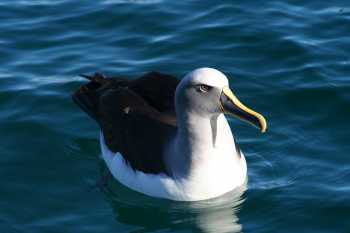New Zealand's Southern Blue Whiting Micromesistius australis fishery has received Marine Stewardship Council accreditation, one of a number of recent fisheries that interact with seabirds to do so.
"The New Zealand Southern blue whiting trawl fishery has been certified as sustainable against the Marine Stewardship Council (MSC) standard for a sustainable and well managed fishery, and its products can now bear the blue MSC ecolabel" (click here).
The certification (from April 2012) applies to vessels operating in the Bounty Platform, Campbell Island Rise and Pukaki Rise management areas within the New Zealand Exclusive Economic Zone (EEZ). Catches of Southern Blue Whiting, a deep-water finfish, are taken mostly by semi-pelagic trawling methods. The certified vessels use mitigation devices (bird bafflers and bird-scaring lines) and manage fish waste discards to reduce interactions with seabirds.

Buller's Albatrosses interact with New Zealand fisheries
Photograph by Chris Golding
In addition, the Macquarie Island Patagonian Toothfish Dissostichus eleginoides fishery (in FAO Statistical Area 81) has also been certified by the MSC from 1 May 2012.
"This fishery was originally restricted to trawling because of concerns about the potential for hook methods to catch seabirds. A trial of longline methods was allowed to commence in the 2006/07 season and the entire catch is now taken by this method, following approval of longline as a fishing method in the fishery."
Th Macquarie Island fishery is managed by measures compatible with the Commission for the Conservation of Antarctic Marine Living Resources (CCAMLR) - which should ensure it remains seabird friendly.
There are currently 163 certified fisheries world-wide in the MSC programme.
John Cooper, ACAP Information Officer, 2 June 2012

 English
English  Français
Français  Español
Español